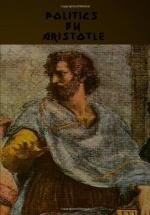
|
| Name: _________________________ | Period: ___________________ |
This quiz consists of 5 multiple choice and 5 short answer questions through Chapter 1, Additional Characteristics of the State & the Role of the Philosopher in the State.
Multiple Choice Questions
1. What does Aristotle calls the pool from which oligarchies draw their officials?
(a) Politically powerful.
(b) Power-groups.
(c) Political elite.
(d) Inherited positions.
2. In Syracuse, a tyranny was overthrown by the people but turned into what?
(a) Warring.
(b) A democracy.
(c) A monarchy.
(d) An oligarchy.
3. Today, Aristotle's work is mainly reviewed where?
(a) Law school.
(b) Elementary school.
(c) High school.
(d) Colleges.
4. Aristotle says that if an individual can get a monopoly, they can do what?
(a) Share the riches with the poor.
(b) Create excess for others.
(c) Provide for their whole family.
(d) Make a lot of money.
5. Aristotle says that kings and tyrants rely on personal power combined with what?
(a) The law.
(b) Military power.
(c) Social power.
(d) Monetary power.
Short Answer Questions
1. Aristotle says that holding property in common, in communal status, leads to what?
2. Legals structures, like constitutions, are starting points for what?
3. Aristotle says that education should be equal but not what?
4. What is the basic unit of society for Aristotle?
5. Oligarchies, according to Aristotle, believe that inequalities of wealth indicate what?
|
This section contains 210 words (approx. 1 page at 300 words per page) |

|




